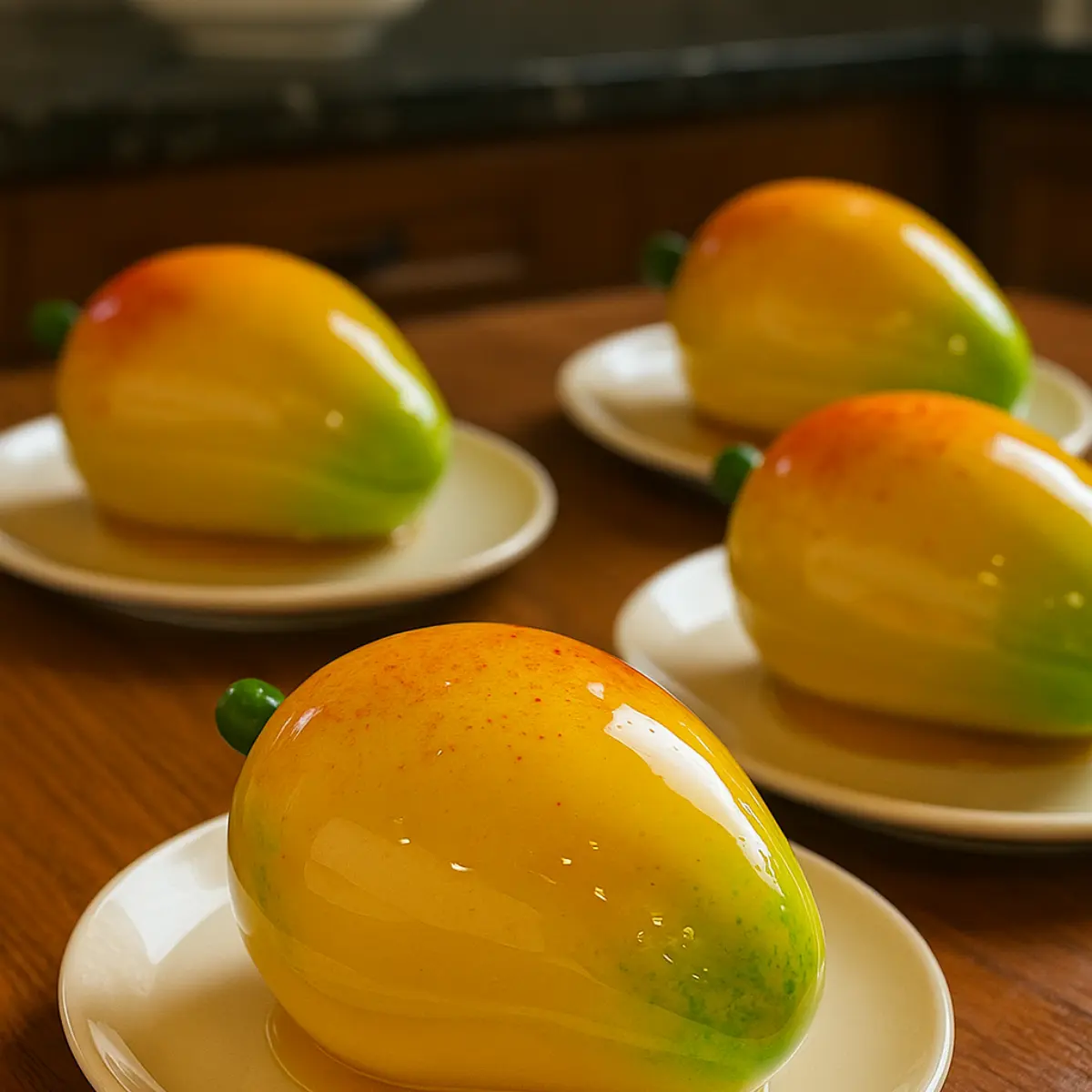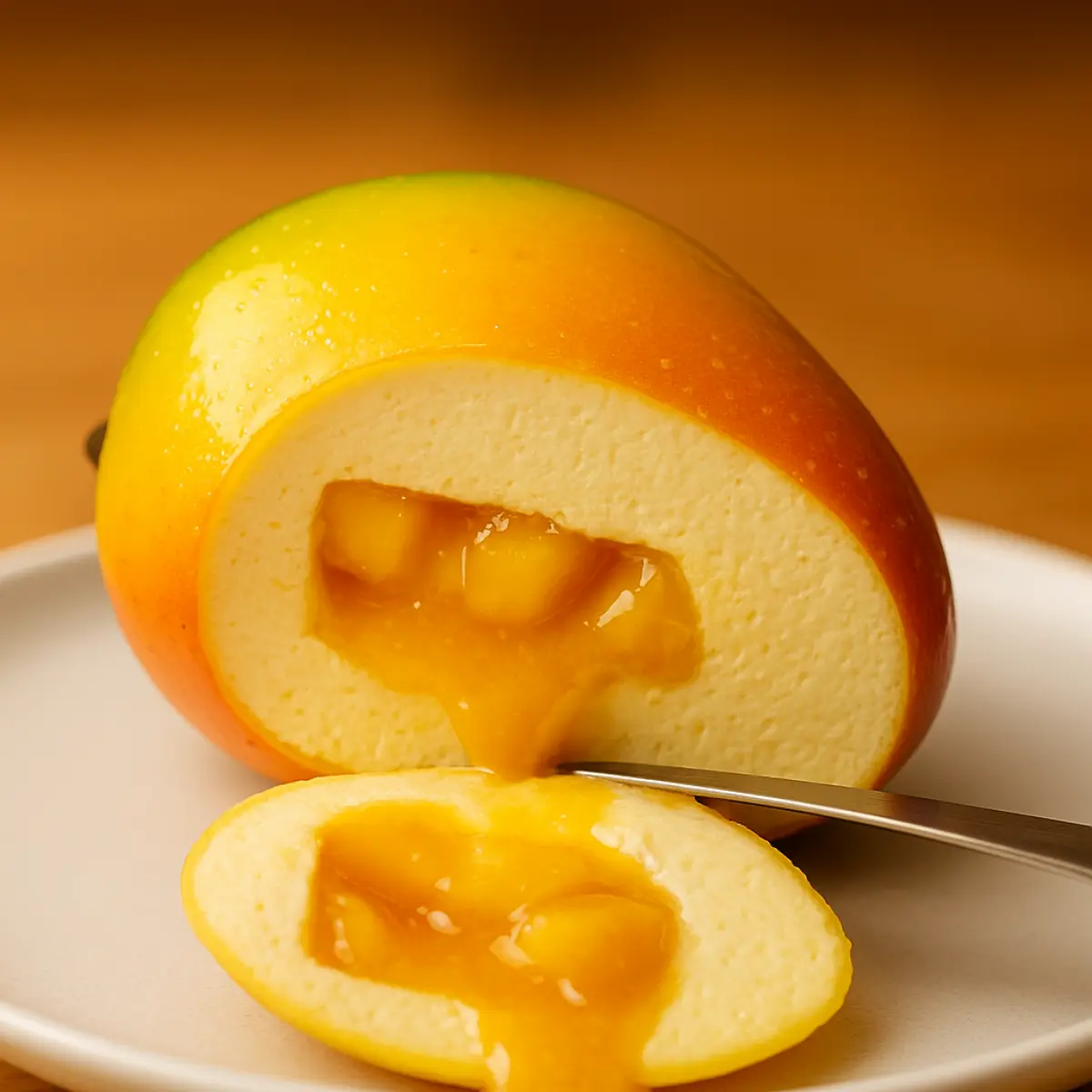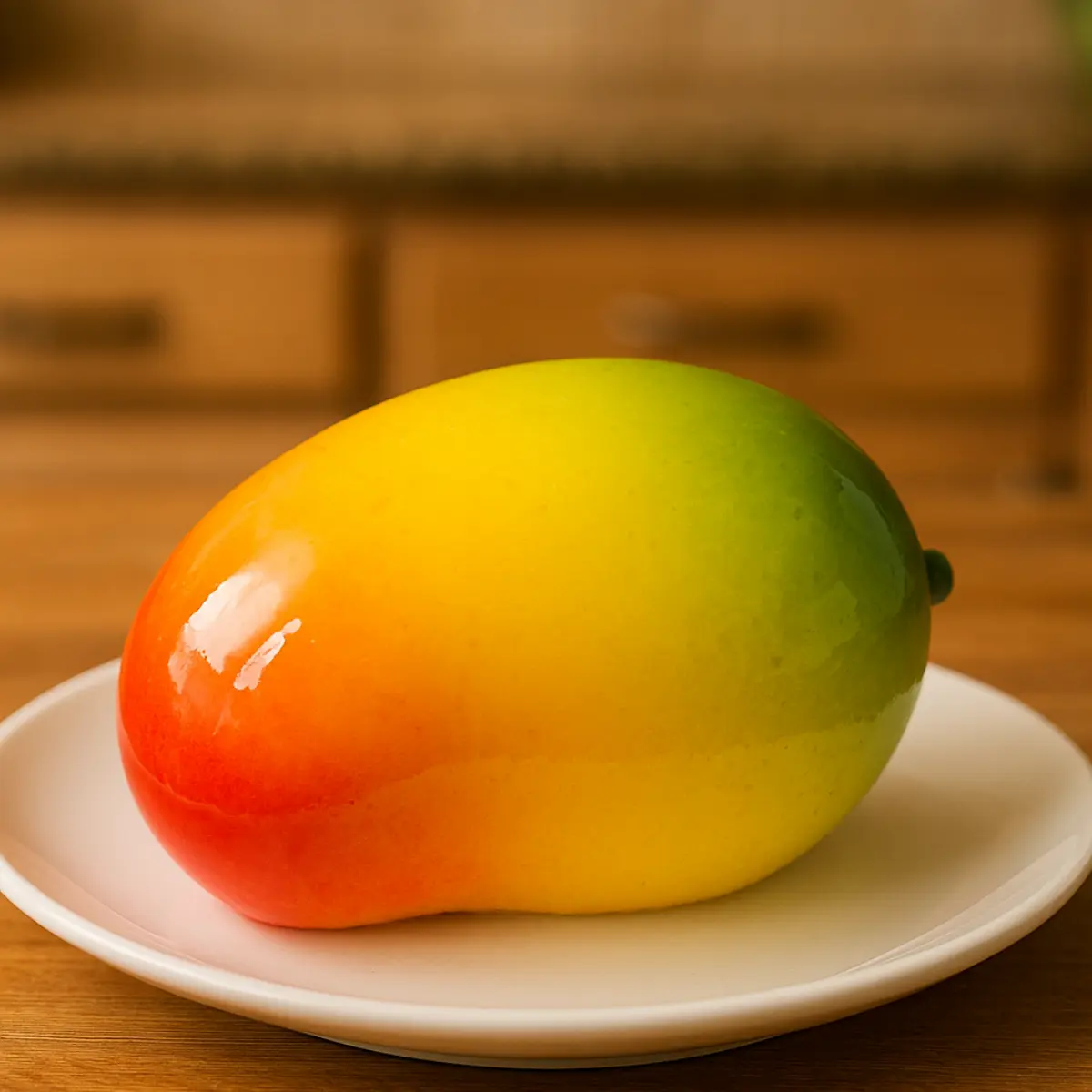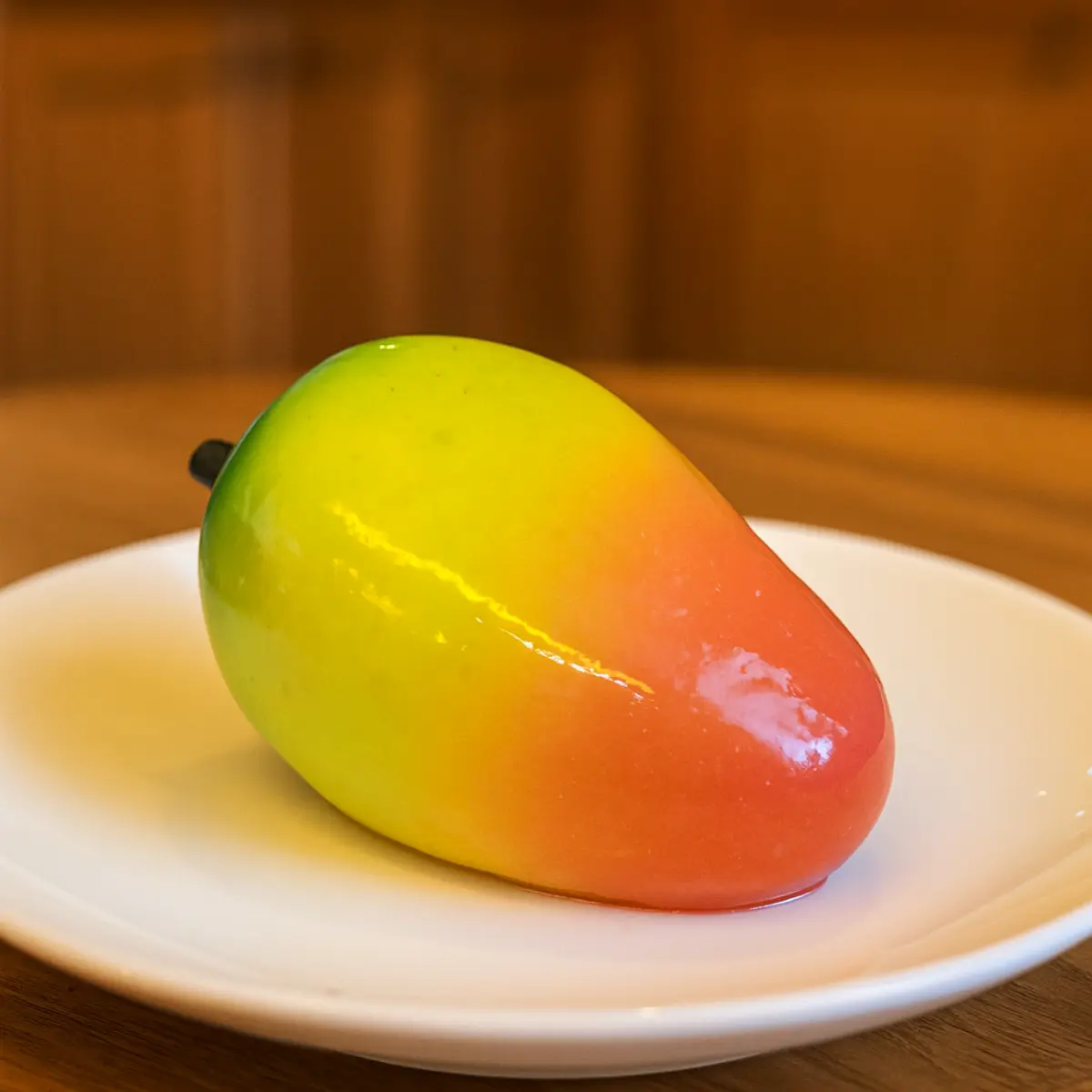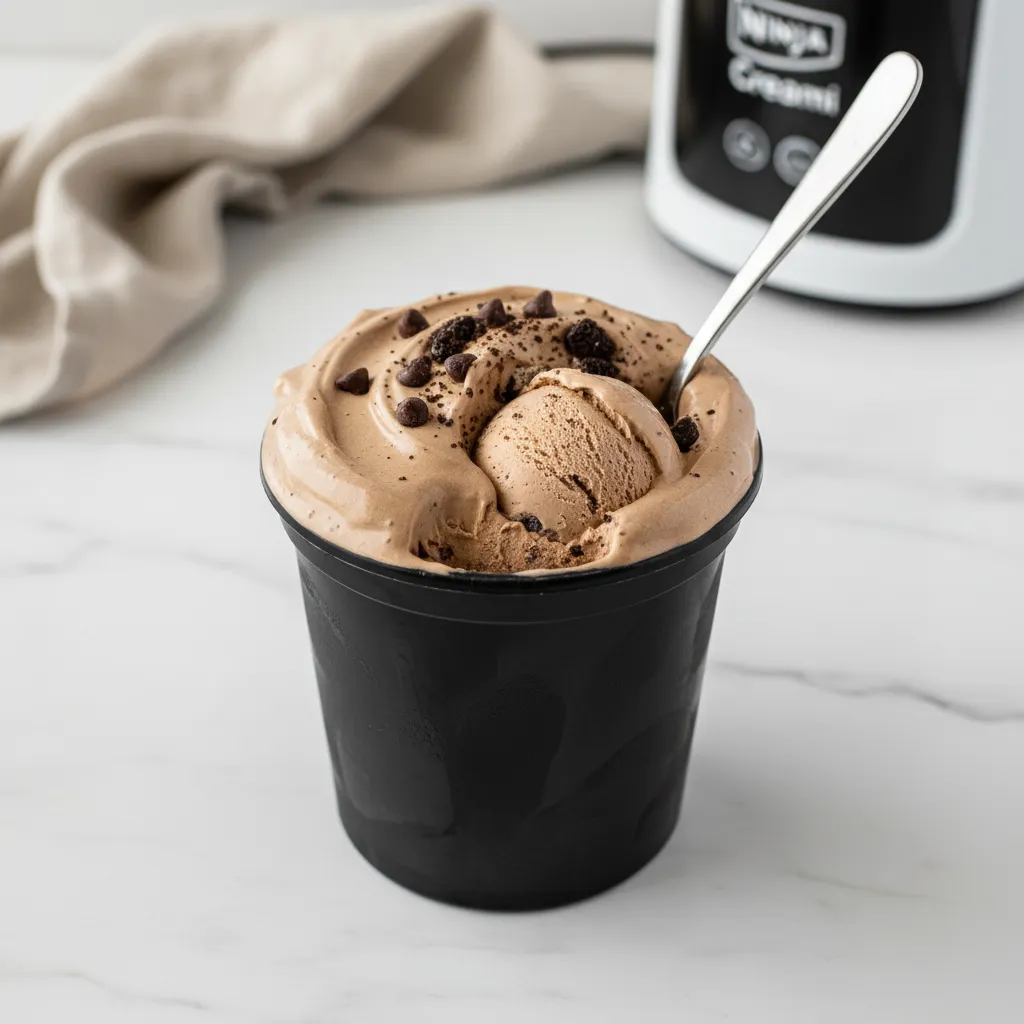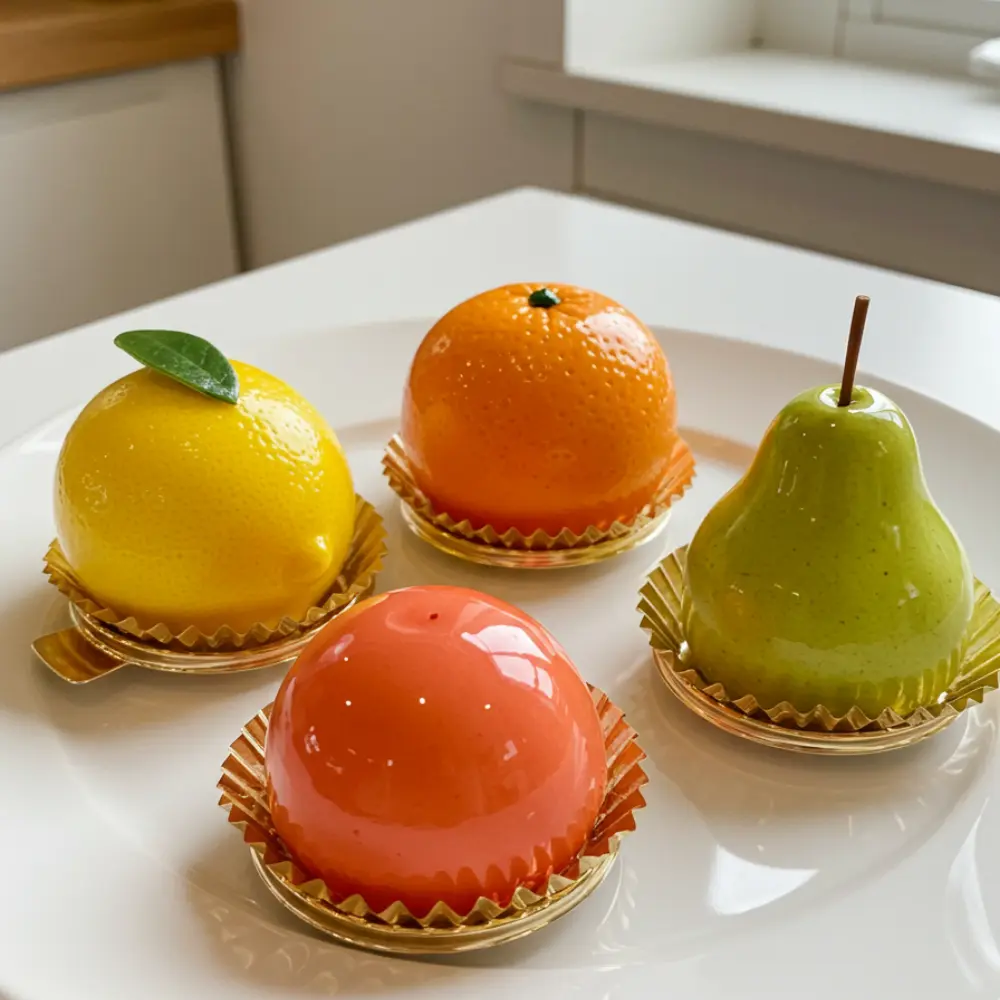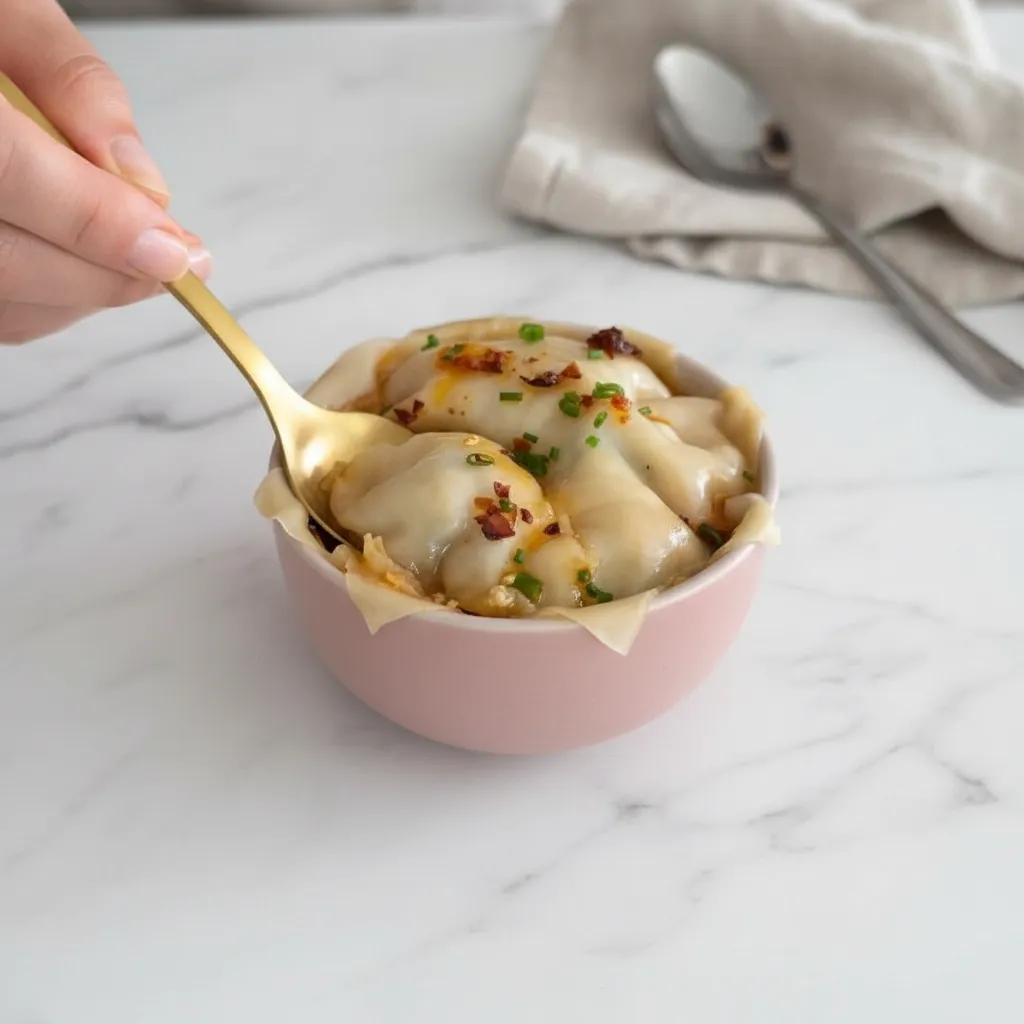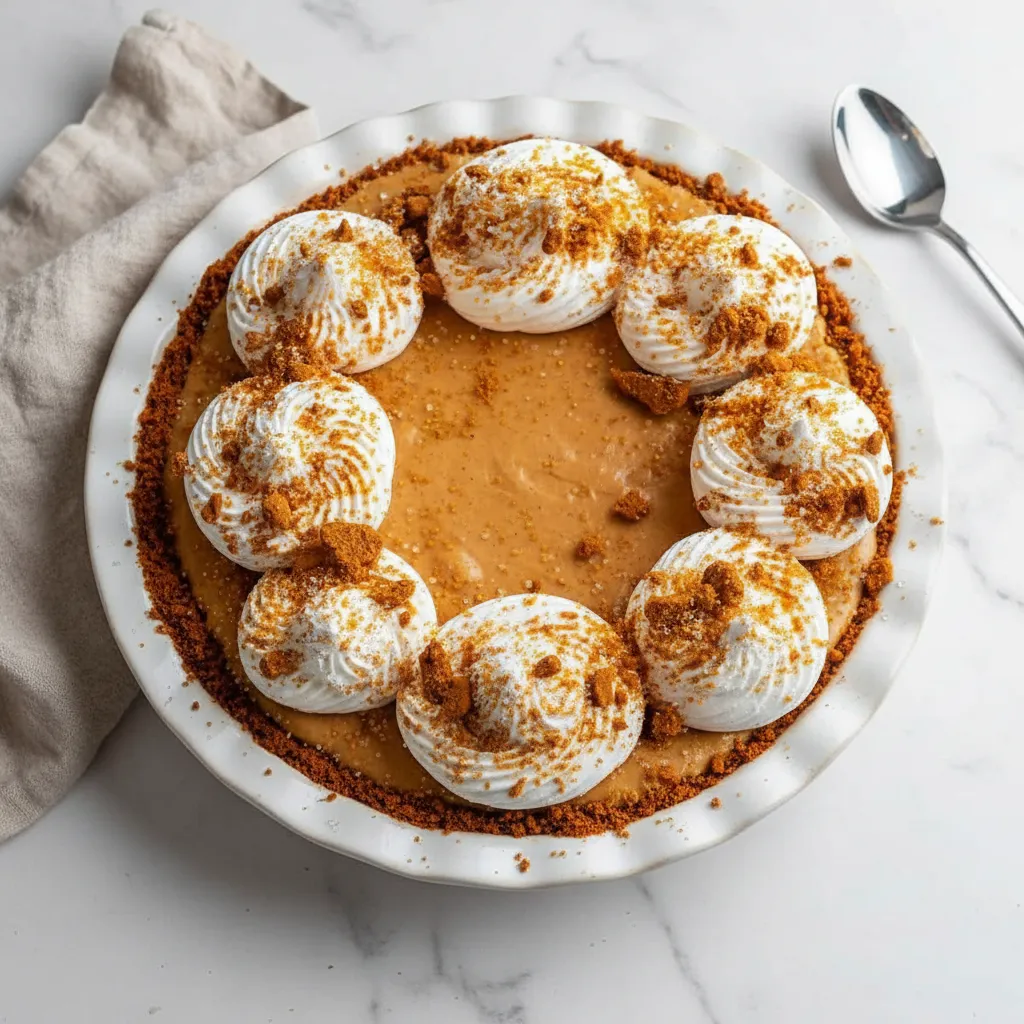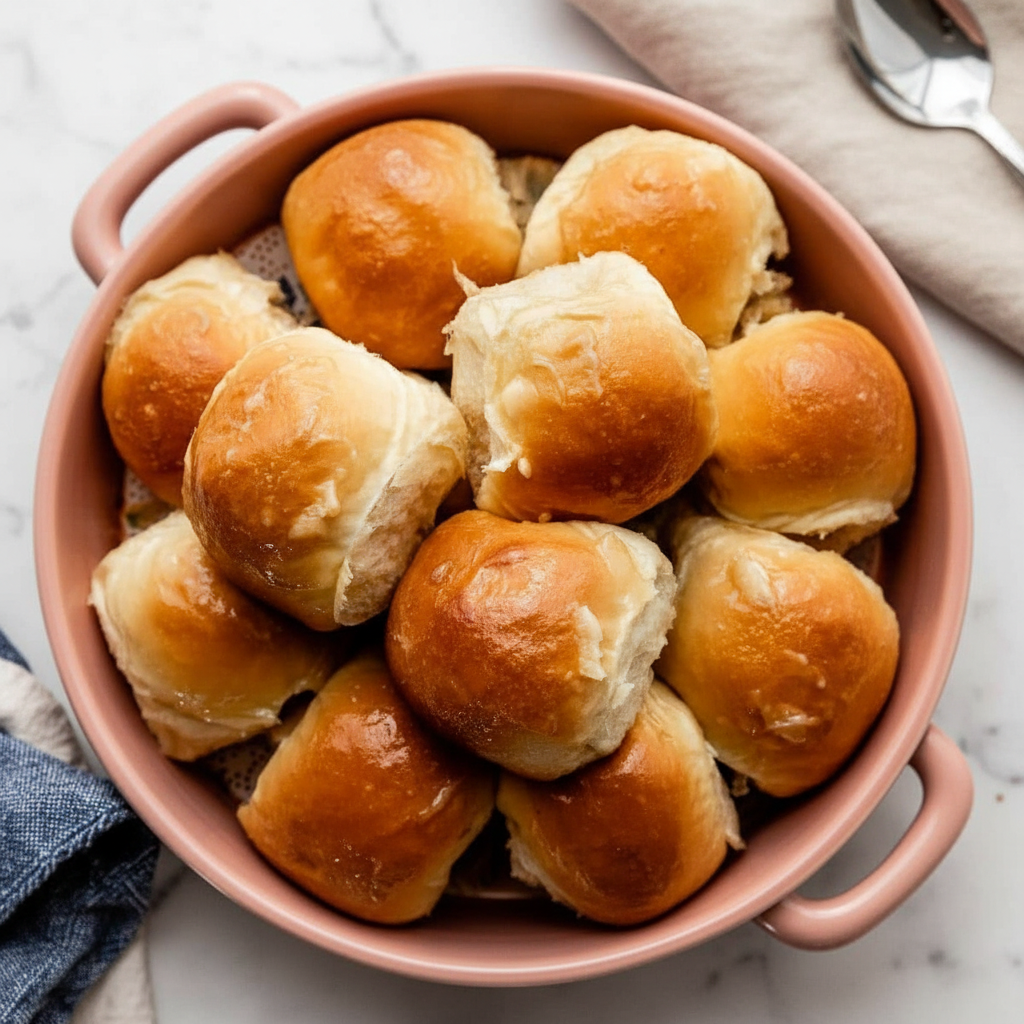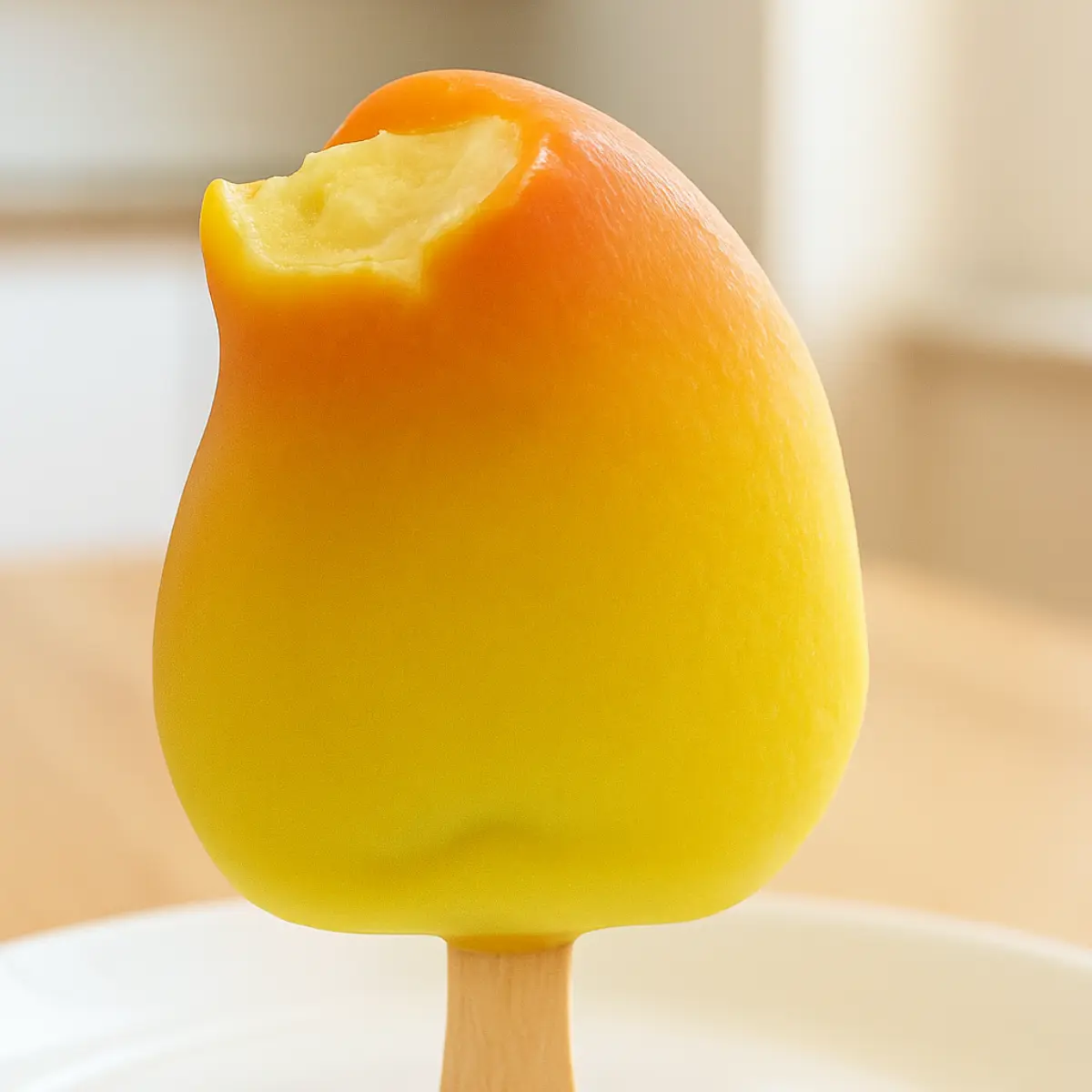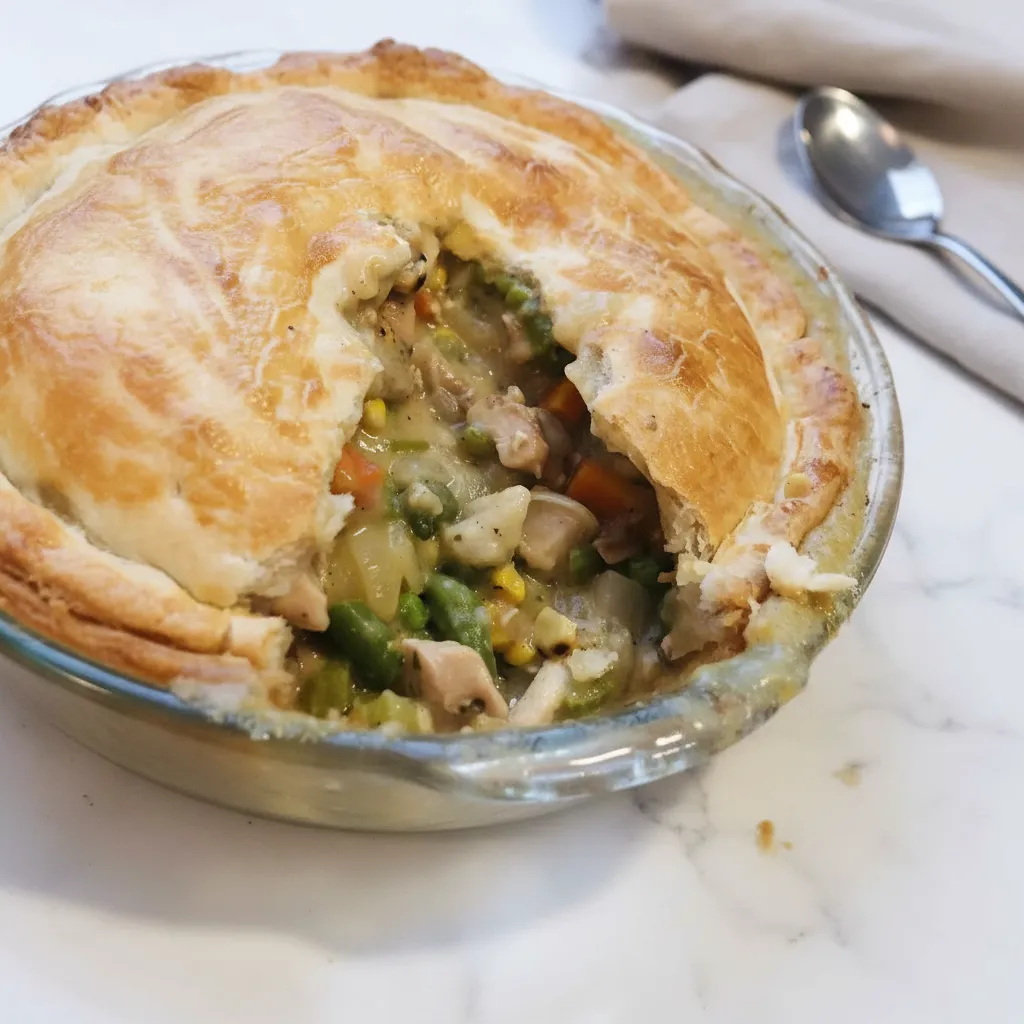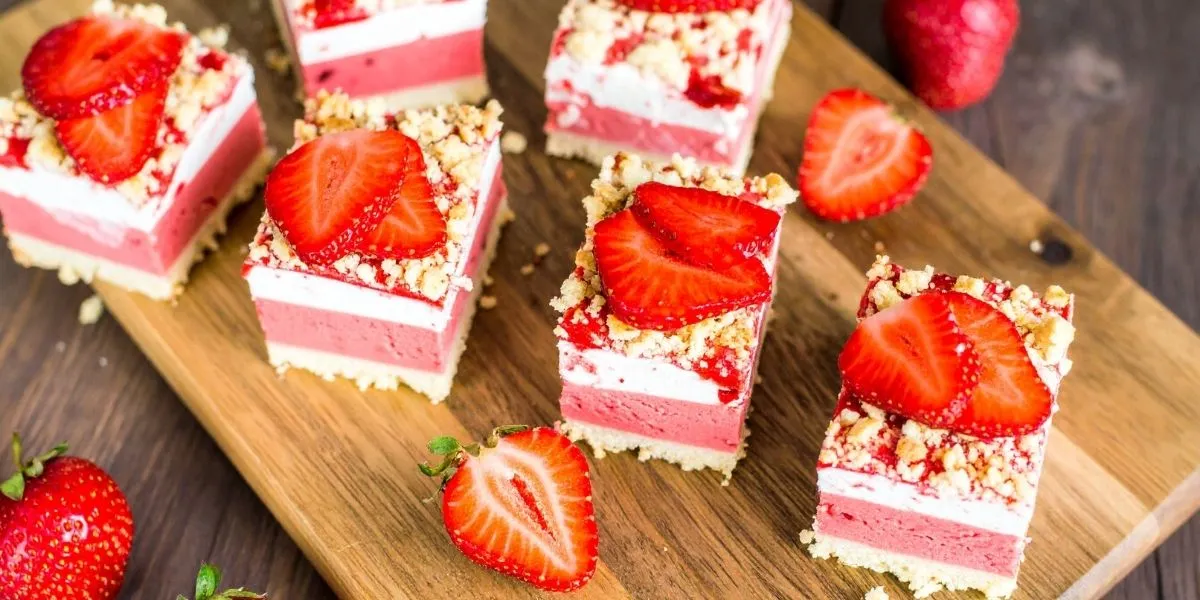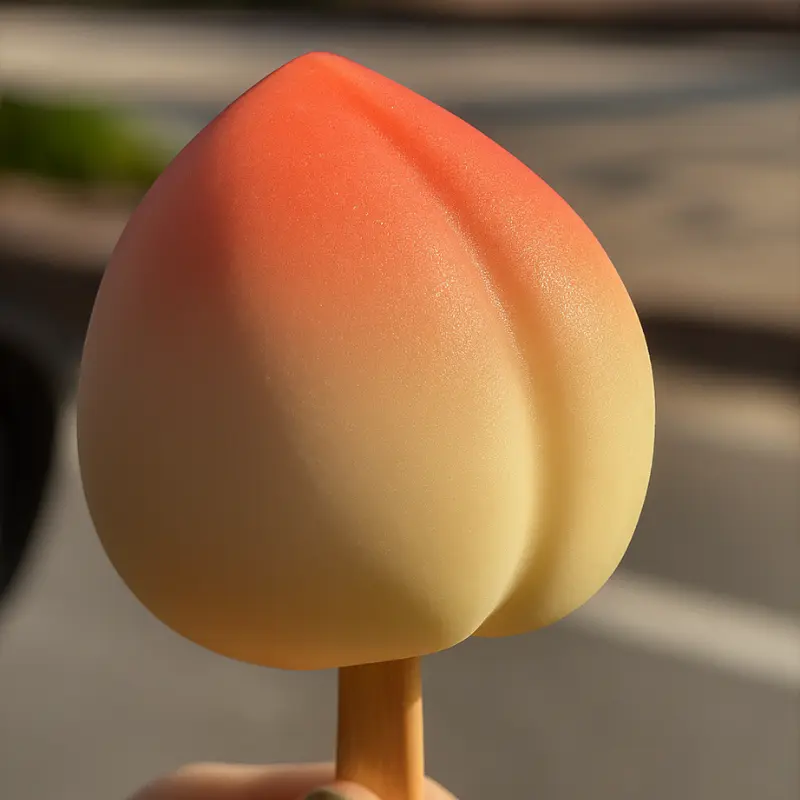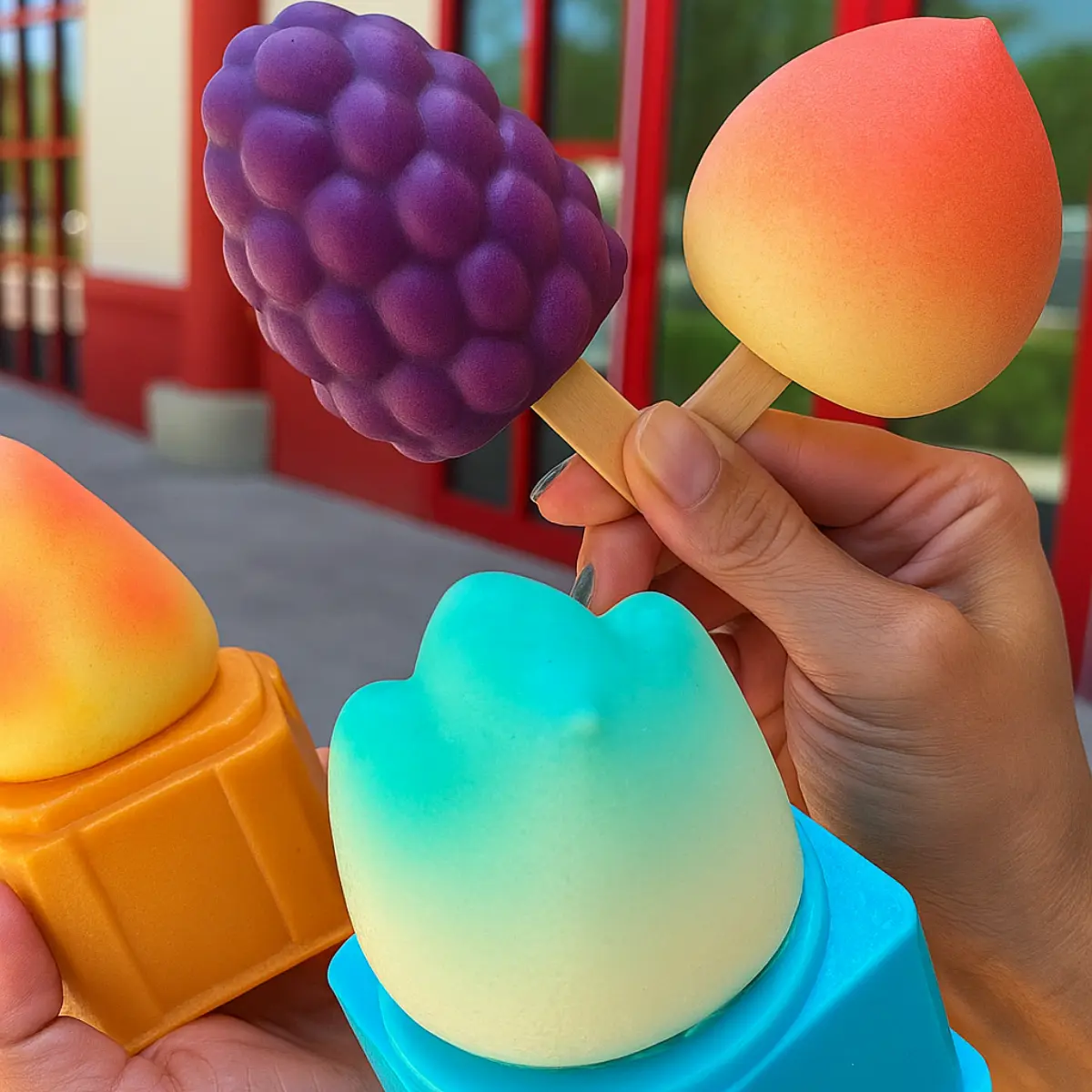There’s a reason Korean mango mousse cake is all over Instagram. The bright golden layers, soft mousse, and delicate presentation make it irresistible from the first glance.
But behind the beauty lies a mix of skill, ingredient choices, and insider tricks that separate a good cake from a great one. In this guide, we’ll break down everything from recipe steps to price hacks.
Jump To:
Chef-Quality Tools You Need

Korean Shaped Mango Mousse Cake
A stunning Korean Mango Mousse Cake inspired by luxury fruit-shaped desserts. Features a mango puree and cube insert, whipped mango ganache, and a realistic mango glaze for a tropical summer treat.
- Total Time: 12 hours
- Yield: 6 mango mousse cakes 1x
Ingredients
For Mango Insert:
2 large ripe mangoes, peeled and chopped
1 tsp lemon juice
1 tbsp lime juice
50g granulated sugar
3g pectin
1 tbsp mango liqueur (optional)
For Mango Ganache:
150ml heavy cream (first half)
2–3 sprigs lemon verbena
200g white chocolate, chopped
5g powdered gelatin, bloomed
100ml mango puree
150ml heavy cream (second half, chilled)
1 tbsp mango liqueur (optional)
For Assembly and Decoration:
Half-sphere silicone molds
White chocolate and cocoa butter (1:1 ratio) for coating
Yellow, green, and red cocoa butter sprays for velvet finish
Instructions
1. Peel the mangoes and cut most into cubes for the insert. Blend the rest with lemon juice into a smooth puree.
2. Strain the puree, add lime juice, sugar, and pectin, then bring to a boil and cook for 2 minutes. Let cool to room temperature.
3. Stir mango cubes into the cooled puree, add mango liqueur if using, and fill half-sphere molds. Freeze until solid. Join two halves to make full spheres and refreeze.
4. For the ganache, heat the first half of heavy cream with lemon verbena, cover, and infuse for 20 minutes. Strain over white chocolate to melt.
5. Add bloomed gelatin, mango puree, remaining chilled cream, and mango liqueur. Blend well, chill overnight.
6. Whip the chilled ganache until light. Fill mango-shaped molds halfway, insert the frozen mango spheres, and cover with more ganache. Freeze until firm.
7. Coat with melted white chocolate-cocoa butter mix for a crisp shell. Spray with colored cocoa butter for a realistic mango finish.
8. Allow to thaw slightly before serving for the perfect creamy texture.
Notes
Use ripe, fragrant mangoes for best flavor.
Mango liqueur is optional but deepens the tropical taste.
Work quickly when assembling to keep components cold and stable.
- Prep Time: 1 hour 30 minutes
- Cook Time: 10 minutes
- Category: Dessert
- Method: Mousse, Frozen, No-Bake
- Cuisine: Korean-Inspired
- Diet: Vegetarian
Nutrition
- Serving Size: 1 cake
- Calories: 320
- Sugar: 26g
- Sodium: 40mg
- Fat: 20g
- Saturated Fat: 12g
- Unsaturated Fat: 6g
- Trans Fat: 0g
- Carbohydrates: 30g
- Fiber: 2g
- Protein: 4g
- Cholesterol: 50mg
Korean Mango Mousse Cake Recipe Breakdown
The Korean Mango Mousse Cake is a delicate blend of airy sponge, smooth mango mousse, and a glossy glaze that makes it both delicious and visually stunning. This dessert combines fresh tropical flavor with the artistry of Korean patisserie, creating a treat that is as beautiful as it is satisfying. Perfect for birthdays, tea parties, or simply as a self-indulgent dessert, it can be made at home with a little patience and the right technique.

The recipe requires careful attention to ingredient quality and timing. Using ripe, sweet mangoes will elevate the flavor naturally, and chilling between layers helps keep the cake stable. If you have never tried making mousse before, this guide will break it down into manageable steps so you can achieve a professional result in your own kitchen.
Ingredient list essentials (mango, cream, cake base)

For the best Korean Mango Mousse Cake, start with top-quality ingredients. Fresh mango puree brings the natural sweetness, while heavy cream gives the mousse its signature softness. The cake base is typically a light sponge that supports the layers without overpowering them.
Essential components include:
- Ripe mangoes or high-quality frozen puree
- Heavy whipping cream for smooth mousse texture
- Granulated sugar for balanced sweetness
- Gelatin or agar to set the mousse
- A light sponge cake as the base
Selecting fresh, seasonal mangoes will give you the most vibrant flavor, and using pure cream instead of substitutes will ensure the mousse sets correctly.
Step-by-step assembly guide layers, chilling tips

The key to a flawless Korean Mango Mousse Cake is patience and layering. Begin by preparing the sponge base and allowing it to cool completely. Next, whip the cream and fold it gently into the mango puree to avoid deflating the mixture.
Assembly steps:
- Place the sponge layer in a cake ring or mold.
- Pour half the mango mousse over the sponge and chill for 30 minutes.
- Add a thin layer of mango puree for added flavor.
- Pour the remaining mousse on top and smooth the surface.
- Chill for at least 4 hours for a firm set.
Chilling between layers prevents them from mixing and ensures a clean cut when served.
Time-saving tips for busy bakers

Making a Korean Mango Mousse Cake from scratch can be time-consuming, but a few shortcuts make it easier without sacrificing quality. Use ready-made sponge cake from a bakery to save baking time. Pre-puree and freeze mangoes in advance so you can assemble the mousse quickly.
Other tips:
- Prepare the mousse a day ahead to allow flavors to develop
- Use a springform pan for easy release
- Keep all tools and bowls cold for faster whipping
These tricks make the process faster while still giving you a professional-looking result.
Korean Mango Mousse Cake Price Guide

If you have been eyeing the Korean Mango Mousse Cake in bakeries, you may notice that prices vary widely. Factors such as location, patisserie reputation, and ingredient sourcing all influence the cost. In Korea, you might find these cakes in boutique dessert shops or high-end cafes, while international prices can be significantly higher due to import costs and specialty ingredients.
Understanding the price range will help you decide whether to buy or bake. This guide will help you compare local and international prices and understand why some cakes cost much more than others.
Average pricing in Korea vs. internationally
In Korea, a small Korean Mango Mousse Cake can cost anywhere from 20,000 to 35,000 KRW. Larger or premium versions may reach 50,000 KRW. Internationally, prices can double or triple due to ingredient sourcing and shipping fees. For example, in the United States, you might pay between 35 and 70 USD for a similar cake from a Korean-style patisserie.
Knowing these ranges helps you budget whether you plan to buy locally or order from overseas.
What drives price ingredients, branding, patisserie prestige
The cost of a Korean Mango Mousse Cake is influenced by multiple factors:
- Ingredients: Fresh mango, imported creams, and specialty glazing gels raise costs.
- Branding: Cakes from well-known patisseries carry a premium.
- Labor: Skilled pastry chefs invest hours in crafting intricate layers.
- Presentation: Decorative toppings, gold leaf, or custom packaging add to the price.
These elements combine to create both the aesthetic and the price point.
How to get the best value sales seasons, promos
To enjoy Korean Mango Mousse Cake without overspending, look for seasonal promotions. Many bakeries offer discounts during off-peak months or around holidays when they launch new flavors. Joining a patisserie’s loyalty program can also give you access to members-only offers.
Practical savings tips:
- Order during weekdays instead of weekends
- Buy smaller individual servings to sample quality before committing to a full cake
- Check for online coupons or delivery service discounts
Where to Buy Korean Mango Mousse Cake Near Me
If baking is not your thing, finding a Korean Mango Mousse Cake nearby can be just as satisfying. Depending on your city, you may have access to Korean bakeries, specialty dessert cafes, or even online delivery options. The trick is knowing where to look and how to spot quality.
With the right search terms and a few insider tips, you can find a cake that tastes as good as it looks without hours of searching.
How to search effectively online “Korean cake near me”
When searching for Korean Mango Mousse Cake, use precise keywords like “Korean cake near me” or “mango mousse Korean style” in your preferred search engine or food delivery app. Filter by highest-rated results and check recent customer photos for freshness and presentation.
Pro tip: Use social media hashtags like #KoreanMangoMousseCake to find hidden local gems.
Top Korean bakeries known for mango mousse global delivery aware
Some Korean bakeries have built international reputations for their mango mousse cakes. Brands like Paris Baguette, A Twosome Place, and select boutique patisseries in Seoul offer online ordering and international delivery.
Internationally, specialty dessert shops in cities like Los Angeles, New York, and London also carry authentic versions. Always check if the bakery ships chilled or frozen for freshness.
Tips for phone-ordering or gift delivery
When ordering Korean Mango Mousse Cake for delivery or as a gift, confirm storage instructions and shelf life. Ask if the cake will be delivered chilled and request insulated packaging.
Additional ordering tips:
- Call ahead during busy seasons
- Ask about customization for birthdays or events
- Check refund or replacement policies for damaged deliveries
What Is Mango Mousse Cake Anyway
The Korean Mango Mousse Cake is a creative twist on a classic French mousse cake. It combines the light, airy texture of mousse with tropical mango flavors, layered over soft sponge and finished with a smooth glaze. Korean bakers are known for adding artistic touches, making these cakes as visually appealing as they are flavorful.
This dessert has become a staple in Korean patisseries and a favorite among dessert lovers worldwide, in part due to its beautiful presentation and refreshing taste.
Origins and evolution French mousse meets Korean patisserie
The origins of mousse cake trace back to France, where mousse was used to create airy, creamy desserts. Korean pastry chefs adopted this technique and infused it with tropical mango, creating a vibrant, fruit-forward treat. Over time, presentation became just as important, with Korean patisseries using clear molds, mirror glazes, and fresh fruit toppings to make each cake unique.
Typical components cake, mousse, glaze
A traditional Korean Mango Mousse Cake has three main elements:
- Cake base: A light sponge or genoise
- Mango mousse: Creamy blend of whipped cream, mango puree, and setting agent
- Glaze: Mango or neutral glaze for a glossy finish
These layers are carefully balanced to create a dessert that is both light and satisfying.
Why it’s so popular on Instagram and TikTok
The bright golden color of Korean Mango Mousse Cake, paired with its delicate structure, makes it a favorite for social media posts. Food bloggers and influencers love to showcase its glossy surface, clean layers, and fresh fruit garnish. Beyond looks, its refreshing taste and melt-in-your-mouth texture make it a dessert worth sharing online and in real life.
Mousse Cake Recipe Mango Variations
The Korean Mango Mousse Cake is delicious on its own, but variations keep things exciting. By adjusting the fruit, layering techniques, and additional flavors, you can create a custom cake that fits your taste or dietary needs.
From tropical twists to seasonal fruit swaps, experimenting with this recipe can open up an entirely new world of dessert possibilities. The key is maintaining the light mousse texture while letting the mango remain the star.
Using fresh vs. frozen mango puree
Choosing between fresh and frozen mango puree will affect both flavor and texture in a Korean Mango Mousse Cake. Fresh mango puree provides a vibrant, natural sweetness and aroma that frozen puree sometimes lacks. However, frozen puree is convenient and available year-round, making it a practical choice when fresh mangoes are out of season.
If using frozen puree, look for brands without added sugar to avoid overpowering the mousse. Always thaw and strain the puree to remove excess liquid before mixing it into the cream.
Gluten-free, dairy-free, and vegan versions
Creating an inclusive version of Korean Mango Mousse Cake is easier than it sounds. For gluten-free adaptations, replace the sponge base with almond flour cake or gluten-free flour blends. For dairy-free or vegan options, use coconut cream or soy yogurt for the mousse, and agar agar instead of gelatin as the setting agent.
The flavor stays tropical, and the texture remains light with the right substitutions.
Flavor twists coconut, passion fruit, matcha layers
Adding layers of coconut mousse or passion fruit puree can give the Korean Mango Mousse Cake an exotic flair. A thin matcha sponge base can add a subtle bitterness that balances the sweetness of the mango. Each variation not only changes the flavor profile but also makes the cake more visually interesting.
Mango Mousse Cake Without Gelatin
Not everyone can enjoy desserts with gelatin, and that’s where the Korean Mango Mousse Cake without gelatin comes in. This alternative uses plant-based gelling agents, allowing those with dietary restrictions or preferences to still savor the creamy texture.
Making a mousse without gelatin requires balancing the liquid and setting agent carefully to keep the cake light yet firm enough to slice.
Why skip gelatin dietary restrictions, preference
Gelatin is animal-derived, which makes it unsuitable for vegetarians, vegans, and certain religious diets. Additionally, some people simply prefer plant-based options. Choosing a gelatin-free Korean Mango Mousse Cake ensures a wider range of guests can enjoy it.
How to use agar agar instead
Agar agar, made from seaweed, is a common substitute for gelatin in Korean Mango Mousse Cake recipes. It sets more firmly than gelatin and doesn’t melt at room temperature. To use it, dissolve the powder in boiling liquid before mixing it with mango puree and cream. Adjust quantities carefully since agar agar can set too hard if overused.
Texture differences comparison gelatin vs. agar
A Korean Mango Mousse Cake made with gelatin will have a softer, melt-in-your-mouth feel, while agar agar produces a firmer, slightly more brittle texture. While some prefer the delicate mouthfeel of gelatin, others appreciate the stability and cleaner cut agar agar provides.
Vegan Korean Mango Mousse Cake
A vegan Korean Mango Mousse Cake keeps the tropical flavor and creamy texture without any animal products. With the right plant-based ingredients, it can be just as indulgent and beautiful as the traditional version.
This version replaces dairy with coconut cream or soy-based alternatives and uses agar agar or carrageenan to set the mousse.
Dairy substitutes coconut cream, soy yogurt
Coconut cream is a favorite for vegan Korean Mango Mousse Cake because it whips well and adds a subtle tropical note that complements the mango. Soy yogurt can also be used for a lighter, tangier mousse. Whichever you choose, make sure it’s unsweetened to maintain control over the dessert’s flavor balance.
Plant-based setting agents agar, carrageenan
Agar agar works well in vegan recipes, but carrageenan can create a smoother, silkier texture closer to gelatin. Both are plant-based and allow the mousse to hold its shape without compromising on mouthfeel.
Making it “mousse-y” without gelatin or dairy
Achieving the airy texture of a traditional Korean Mango Mousse Cake without dairy or gelatin involves whipping plant-based cream to soft peaks before folding in the mango puree and setting agent. This gentle folding keeps the mixture light and prevents it from becoming dense.
FAQ
What is in Porto’s mango mousse cake?
Does mango mousse cake have gelatin?
What are the ingredients in T&T mango mousse cake?
How do you make mango mousse?
Does Portos mango mousse cake have gelatin?
What is the liquid they put on sponge cake?
Share Your Experience
We would love to hear your story about trying Korean Mango Mousse Cake. Did you bake it at home using our tips, or discover a patisserie that serves a slice worth remembering?
Share the details—your first bite, the texture, the sweetness, and even the little surprises that made it special. Whether it was a triumph in your kitchen or a delightful find in a bakery, your experience can inspire other dessert lovers to give it a try.
If you snapped a photo of your meal, share it on Pinterest or Facebook and tag @CookFastRecipes so I can see and feature it in my stories. Let’s keep the quick, healthy snack ideas flowing!


